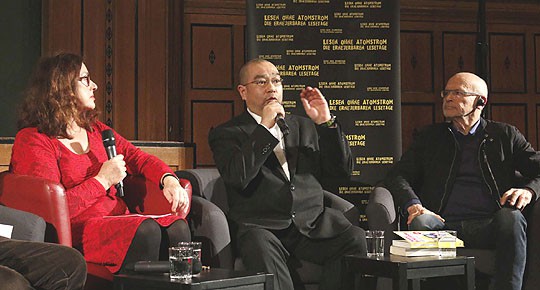
Photo: Andreas Conradt
It’s very important that we all remind ourselves of the following: on the occasion of the sixth anniversary of the nuclear catastrophe at the Fukushima power plant in Japan the literature festival “Reading without Nuclear Power” took up a topic that’s all but forgotten – the plight of “disposable workers” at nuclear power plants. The discussion panel in Hamburg, which I chaired, featured a number of high-profile participants: the Japanese journalist Tomohiko Suzuki presented his book “Inside Fukushima”, which had been published in German only a few days earlier. For his research he worked covertly in the damaged power plant so it was an obvious choice to also invite the German investigative journalist and author Günter Wallraff onto the podium. In the 1980s he also went undercover to expose the recruitment structures for power plants within the nuclear industry. The actress Anna Thalbach read from “Inside Fukushima” to stunning effect while Sebastian Pflugbeil, an expert on the nuclear lobby and the President of the German Society for Radiation Protection (GSS) revealed a wealth of detailed information from national and international regulation authorities. If the topic wasn’t so depressing and the experiences of the undercover researchers so terrible – and terribly similar – the 500 members of the audience, as well as myself, could have returned home with a spring in our steps.
However, what we heard was truly sobering: Suzuki described his colleagues from his time undercover as ordinary people who need money. Recruitment, he said, was the responsibility of the Yakuza, the Japanese mafia, whose members were recognised people well-grounded in society.
Günter Wallraff recounted similar findings from 1980s Germany. He said those responsible for the recruitment of staff for especially dangerous tasks in nuclear power stations had been well-connected “human traffickers” who were acknowledged by local political actors. He added that even homeless persons had been recruited because the maximum radiation dose for workers at the time was reached very quickly and therefore many people were needed. It’s not for nothing that critics call these people “disposable workers”.
Indeed, nuclear expert and critic Sebastian Pflugbeil supports these claims on the basis of publicly available data. According to a 2011 answer by the federal government in response to a parliamentary query by the Left party in 2009 roughly 6,000 regular employees worked and were being monitored for radiation exposure in 17 nuclear power plants across Germany. In contrast, more than 24,000 subcontract staff also worked there and were being monitored. “Specialists on permanent contracts are too expensive to be exposed to high dosages of radiation because it makes them unusable too quickly”, Pflugbeil summarized matter-of-factly.
He rates as strange the way Japan treats nuclear power. In spite of the experiences the country made at the end of the Second World War, when nuclear bombs were dropped on Hiroshima and Nagasaki, the Japanese liked to repress the topic, he said. He added that institutions of higher education were afraid to deal with the issue and that projects that made the danger more visible were redacted.
Suzuki confirmed this. He said the aftermath of the Fukushima tsunami had not been as dramatic as had initially been feared, which had led many to believe that the accident didn’t compromise everyday life and that the nuclear energy issue could somehow be brought under control. Nevertheless, Suzuki is convinced that one day there will be no more nuclear power plants on the planet. Maybe his book will play a small part in reaching this goal.
 Monika Griefahn GmbH
Monika Griefahn GmbH
Leave a Reply